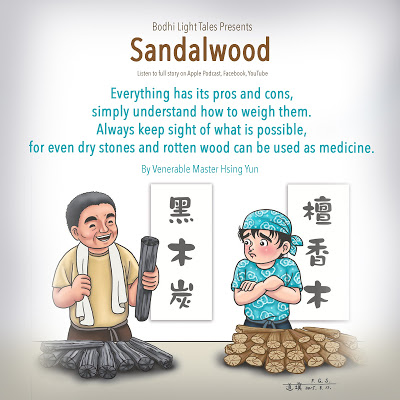Humble Table, Wise Fare
Every moment is a dawn,
every challenge an opportunity,
every adverse circumstance a test,
every good deed a creation.
News
Sandalwood
Find out what happened in this podcast episode : http://bit.ly/3seLnLp
Once upon a time, there lived a sandalwood merchant named Cody. He thought highly of his sandalwood and worked hard at promoting it.
“Quality sandalwood for sale. Come in and have a look!” Cody said to the passerby.
“The sweet scent of your sandalwood has filled the street,” the passerby told him.
“Would you like to buy some?” Cody asked.
“No thanks, I can’t afford it!” The onlooker replied and walked away.
Still confident, Cody continued to promote it. Many people were attracted by the fragrance of his sandalwood, but all would simply leave after learning of the price. After a week, Cody began to worry as he had not sold a single piece of sandalwood.
One morning, as Cody opened his shop, he was greeted by another merchant. “Hello there! I’m Roy, nice to meet you!”
“Hi, I’m Cody. How’s it going?” Cody replied.
“Pretty good. It’s nice weather today so I hope we sell a lot! Wow! Your sandalwood smells amazing! Unlike my charcoal...” Roy said.
“Yes, it’s high-quality sandalwood but I haven’t sold any this week,” Cody said disappointedly.
Their conversation was interrupted by a customer, “Are you open yet? I’d like to get some charcoal.”
Roy replied happily, “Yes!” As he served the customer, another showed up to buy his charcoal. By noon, Roy had sold out.
In disbelief, Cody thought, “How is this possible?”
He asked Roy, “Why is your charcoal selling better than my sandalwood?”
“Because charcoal is cheap and much needed by every household. Everyone needs to cook, so they always need charcoal. Besides, my charcoal is priced fairly. Anyway, good luck with your sandalwood. I’m off now!” Roy replied.
For the rest of the day, Cody still had no luck in selling his sandalwood. As he packed up his shop, he thought about what Roy said. An idea popped into his head, “What if I sell my sandalwood for the same price as Roy’s charcoal? Maybe I’ll manage to sell it all too!”
The next day, feeling confident, Cody opened his shop. He began promoting the new price of his sandalwood. Soon, people began queuing up to buy his sandalwood. Some even bought more than one piece!
One satisfied customer said to a passerby, “This sandalwood is on sale! It’s as cheap as charcoal, get it while you can!”
Before noon, Cody had sold out.
Happily, he packed up and said to Roy, “Thanks for the tip! You gave me the idea to lower my price. It’s not even noon yet, but I’ve sold it all. Good luck with your charcoal, I’m off now.” Cody waved Roy goodbye.
As Cody left, Roy smiled smugly, thinking how very foolish Cody was for selling such high-quality sandalwood at such a ridiculously cheap price.
This story highlights that the value and use of something depends on how we view and make use of it. In this story, Cody was too focused on selling all of his sandalwood. He failed to see that sandalwood and charcoal each have their value and use. Lowering the price of his sandalwood to match that of the charcoal is like selling gold for the price of copper. Though Cody managed to sell all of his sandalwood, would he have made enough of a profit to break even, or did he lose more than he actually gained?
Instead, Cody could have considered another approach, such as selling his sandalwood at another market where customers were able and willing to pay his original price. If only he’d realized the true value of his sandalwood and how to make use of it, he would not have compared his sandalwood to Roy’s charcoal.
In other words, if you know how to best make use of something, then it shall become valuable and precious. However, that same item given to someone who doesn’t know how to make use of it, whether it be precious stones or pearls, would be a waste. In the same vein, if a person with the right talent is placed in the right position, it benefits everybody. However, if that same person is undermined, unappreciated, or placed in the wrong position, then no one benefits. Wouldn’t that be a shame?
Everything in this world has value, but the best among us know how to use it, refine it, and make the most of it. It doesn’t matter if it is people, objects, words, or even ourselves; if used improperly, then good opportunities will be missed, good causes and conditions will be wasted, and talents neglected. Anything with potential would end in waste.
Therefore, we must learn to make the best use of everything around us, including talents. To know how to best make use of everything, we must first establish correct values, cultivate a broad vision, and think deeply about the pros and cons. In this way, we gain the ability and insight on how to best use everything around us.
Just as Venerable Master Hsing Yun says,
“Everything has its pros and cons, simply understand how to weigh them.
Always keep sight of what is possible, for even dry stones and rotten wood can be used as medicine.”
OTHER LINKS:
OTHER LINKS:





